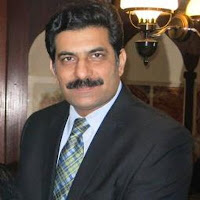Women role in Water Governance
Mubasher Mir
I am
observing since long in my home my wife and younger sister always trying hard
to manage the water usage successfully. While living in Karachi, everybody
knows, what the hell is doing under the Nose of politically influential ruling
elite in water crisis.
So, we
can understand the selfless services of Ladies in house hold. I always observed
in my home, my wife used to put a large bottle to collect the air-conditioner
water in Summer because she knows well the scarcity of water.
When I
was thinking about the water governance, which refers to the political, social,
economic and administrative systems in place that influence water’s use and
management, then I believe there should be a powerful role of women to tackle
the scarcity of water.
We all
know, around the world, women and girls are more often responsible for
collection and management of water in household.
The
credit goes to the Sindh Assembly members
but especially Rana Ansar, on MPA, belonging to the MQM (Pakistan) took up this
amendment to the bill.
The
efforts of “SPO” Strengthening Participating Organization, should be
appreciated loudly. The SPO and other civil society organizations head lobbied
and carried out advocacy efforts to have this bill passed.
It is
matter of rejoice that after the passage of the amendment, women will get representation
in around 45000 Water Course Associations more than 350 farmer organization and
14, Area Water distribution boards. The main aim is to enter the Women in water
resource management and irrigation structures in Sindh Province.
We are well
aware about the issues in water distribution in Sindh Province , because of
influential political elites. According to the reliable sources, there is a priority
list to get irrigation water from canals in Sindh Irrigation Department. This
could be the huge challenge to implement this amendment to empower the women
farmers, those who have not political power in the province.
Women
are the part of the farming community of Sindh. Besides owning their small
land, they also work as farm workers at their neighbour’s land.
Women
constitute 49% of Pakistan’s population but only 24% of Pakistan’s Labour force
as per the Globle Gender Gap 2018
report. In the recently held provisional census, women (22.956m) are half of
Sindh’s total population of 47.883 million which is 48% and they mostly live in
Sindh with a dismal literacy rate when compared with the Urban literacy rate.
So, it
could be the huge challenge for civil society organizations to train and
educate the women farmers to give active participation in water distribution
boards and water course associations as members. A short course should be
introduced to certify the women farmers to become the active members,
According
to the amended bill, two women of the (FO) Farmers organization command Area,
of one may be local Union Council member, having strong farming background in
irrigated agriculture and water, provided that one women member shall be Land
less.
Two
prominent women of the (AWB) Area Water Board Command area having strong
farming background in irrigated agriculture and water if available, preferably member of Board of management of
any farmer organization. .
It is a
responsibility of (SIDA) Sindh
Irrigation Development Authority to
implement this law with letter and spirit. So, SPO (Strengthening Participating
Organization) also facilitated SIDA for
the development of rules of business regarding women’s inclusion in farmer
organizations, water courses associations and area water board. Approval of developed ROBs by SIDA law
department would be a progressive step for empowering farmers women in the
water governance decision making bodies.
According
to the Pakistan Bureau of Statistics (PBS) women make 77% of farmers in Sindh,
which is a huge number. A 2015 study, revealed that women’s role as the farmers
has enhanced in last two decades and the major reason behind is that a major
chunk of men has left for cities or developed areas for better earnings and
escape the landlord system.
Specially
in Sindh, the labour from rural areas are coming to the Urban Sindh, it shows
the distrust of previous injustice system of Mazara’s and Harri’s
The recruitment
in armed forces of Pakistan has been increased during the last two decades, now
it’s about 14% from the Sindh province. So, the female participation as farmers
has been increased in rural areas.
The
people who are living on the tail end of canals, they told their stories, which
are heart breaking, because they could not control their tears while telling
the insides about their problems.
Despite
owning acres of land, they could not cultivate because water does not reach
their lands. They want to live like politically influential farmers. Water has
always been wealth in all agricultural areas.
In 1816,
at time when the British still ruled the subcontinent Sir, Charles Trevelyan said,
“Water is more valuable than land.” His saying is still valid.
The
province of Sindh in Pakistan is bestowed with an irrigation network with 14
canals and move than 45000, small channels, and three Barrages.
The
participation of women in water distribution structure should be taken as
healthy change. Women could be able to implement the drip and sprinkle
irrigation system as revolutionary change to overcome the scarcity of
water.








